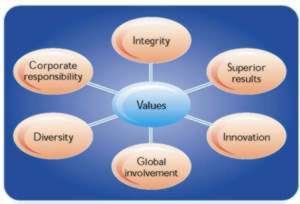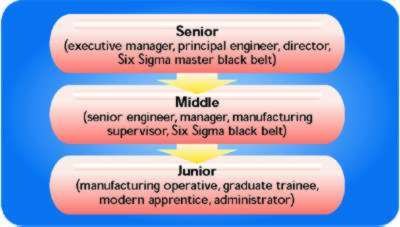Cummins – a leader in the market for power
Operating in B2B markets, Cummins is a leading world-wide designer and manufacturer of high performance diesel engines, electrical power generation systems and related products. The company operates in countries across the globe with annual turnover of around $8.4 billion.
Cummins has been established in the UK for 50 years. Its 6 manufacturing plants located countrywide employ 5,000 people. Like many other companies, Cummins has a vision that gives it a focused view of where it wants to be. It sees itself as ‘making people’s lives better by unleashing the power of Cummins.’ To help it achieve this vision, Cummins has a range of supporting values:
- integrity: strive to do what is right and do what we say we will do
- innovation: apply the creative ingenuity necessary to make us better, faster, first
- superior results: exceed expectations consistently
- corporate responsibility: serve and improve the communities in which we live
- diversity: embrace the diverse perspectives of all people and honour with both dignity and respect
- global involvement: seek a world view and act without boundaries.

It is vitally important to Cummins that the people it employs understand, share and implement its vision and values. This makes recruiting and selecting the right people a strategic function for the company.
Roles and functions
Ever-rising customer expectations allied to global competition put great pressure on firms to employ not only ‘the right kind of people’ but also the very best from that pool of talent. Cummins is particularly conscious of the high expectations of its customers, which include ERF, DAF and Bombardier. These firms in turn face a highly demanding customers and so look to deal only with suppliers on whom they can depend for high quality products, on time, every time.
Cummins uses a team-based approach to manufacturing. Creating teams that perform well involves a great deal of preparatory work. The team’s composition must reflect the nature of the task, which will usually draw on a wide variety of aptitudes and skills. For example, a typical Cummins team in relation to a particular project will include people whose knowledge, skills and experience are in:
- Manufacturing – Making engines to the highest possible quality. Often employing quality activities such as Six Sigma (see one of Cummins’ previous Case Studies on www.tt100.biz) that help to reduce waste and inefficiency. Roles within manufacturing include not only people working on the factory shop floor as machine operators but also as technicians.
Administration – Ensuring the smooth operation of the manufacturing process by offering appropriate administrative support e.g. keeping records of customers’ orders, Cummins’ orders to its own suppliers, payment of salaries, processing invoices.
Engineering – Designing engines etc and developing the prototypes to their full potential.
Sales and marketing – Discovering customers’ needs and wants. Finding and developing sales opportunities for the company’s products.
Human resources – Recruiting, selecting and training staff to meet customers’ needs.
Purchasing and logistics– Ensuring that components arrive ‘just-in-time’ and that finished goods are shipped around the world quickly and cost effectively.

Cummins offers job opportunities at several different levels. Many staff join the company at a junior level. They include operatives such as modern apprentices working on the factory floor.
Some individuals are recruited as engineers at a higher level. They may be qualified design engineers, with a degree or Phd. Cummins will identify, approach and train the best of them to become Principal Engineers.
Wherever possible, Cummins seeks to fill senior positions through promotion within the company because they share its values. However, it will also look outside the company if necessary. Recruiting from outside provides Cummins with a mix of skills and abilities and helps to make the workforce more diverse. Cummins puts great emphasis on the diversity of its workforce, seeing this as a factor that adds competitive advantage in a global market.
The importance of recruitmentand selection
Recruiting staff is a very costly exercise. It is also an essential part of any business and it pays to do it properly. When organisations choose the right people for the job, train them well and treat them appropriately, these people not only produce good results but also tend to stay with the organisation longer. In such circumstances, the organisation’s initial and ongoing investment in them is well rewarded.
An organisation may have all of the latest technology and the best physical resources, but if it does not have the right people it will struggle to achieve the results it requires. This is true across the whole spectrum of business activity e.g. schools, hospitals, legal practices, restaurants, airlines, and diesel engine manufacturers.
Cummins is well aware of the importance of ‘getting it right’. Poor choices at the recruitment stage can prove expensive. The company needs to be sure of a candidate’s technical competence. For example, if an engineer designs a component that fails and has to be re-engineered, the company loses both time and money and may incur penalty charges on any delay in fulfilling particular contracts. Time and money spent in recruiting that particular employee will have proved expensive and wasteful whilst a better candidate may not only have ‘got away’ but also gone to a competitor.
Cummins was recently first to market with a complete range of engines that met new stringent environmental legislation. Their technical solution to meeting this legislation was completely different to the competitor’s approach. Had it turned out to be ineffective or not to be approved by government authorities, it could have led to the downfall of the company. The responsibility of making the correct decision was shared by relatively few individuals.

In addition to technical competence and appropriate experience, an organisation needs to be sure that it can rely on candidates’ goodwill, loyalty and commitment towards the organisation and its aims. According to the Chief Executive Officer of the Cummins Group, ‘one of the most crucial decisions that a leader will make is the choice of those who will support them.’
In a highly technological competitive market, Cummins requires people who are not only technically competent, well informed, loyal and committed but also capable of showing good judgement, often under pressure. When submitting a written tender for a contract, for example, the team working on it has to decide just what the company can promise to deliver, when and at what price. This can be particularly tricky when offering a new product for the first time e.g. what level of ‘after sales service’ should the tender include, based on the company’s assessment of the risks associated with its new venture?
Advertising the job
Job advertisements form an important part of the recruitment process. Cummins uses various means to communicate job vacancies including:
- newspapers (local and national) – typical costs £3-10k
- recruitment consultants (they have expertise in recruitment and will search their databases as well as maybe advertising jobs) – typical costs 20% of successful candidate’s salary
- Job Centres
- the World Wide Web.
Not all jobs appear in every media form. Junior roles at a particular plant may be advertised within a local newspaper whereas technical posts will be advertised on the web.
The balance of advertising is changing. In 1999 Cummins spent the bulk of its advertising budget on advertising in print. Five years on, virtually all technical and managerial vacancies are via the Internet, reducing the advertising spend by 80 %.Web adverts are more effective for longer than print inserts and can be more closely targeted. It is also easier for the company to keep a record of people who have expressed interest and then automatically e-mail them when similar vacancies emerge.
Using the web helps Cummins to advertise across the world and reach candidates that are more diverse as well as enabling the company to advertise quickly whenever vacancies arise. Cummins’ websites include: www.eujobs.cummins.com
Cummins also uses external web portals, from which people can apply directly. As they do this they can learn more about the company and traffic can be monitored.
Each advert emphasises the knowledge, skills and experience individuals require within each post: these are the competences associated with the post. Position profiles identify the critical technical and non-technical competencies required for each job. These feature within the advert and shape the questions that candidates face at interview.
The interview process
Applicants recruited straight from school, college or university may have little or no job experience to draw upon. For these candidates, interviewers will focus on their personal or academic life and will look to identify the qualities known to support development of the looked-for competencies.
As candidates are interviewed, they are awarded scores against all the critical competencies in the profile for the job. Competences are ranked in order of importance. To have any chance of success, candidates must score well on the key competencies.

For more senior jobs at technical level and above, a line manager will conduct the interviews, helped by a professional recruiter from Cummins’ central recruitment team. Candidates take aptitude tests designed to match their critical competencies e.g. numerical, verbal, mechanical, or spatial reasoning. For certain roles, trained interviewers use personality questionnaires. Cummins keeps its recruitment practices under constant review and evaluation.
Conclusion

In order to maintain business performance and competitive advantage, organisations competing in a global marketplace must recruit the best people they can. For such organisations, recruitment becomes a key component of their overall business strategy.
Cummins provides an excellent example of a company that uses its recruitment procedures to ensure that it meets its business needs in challenging and competitive circumstances.
